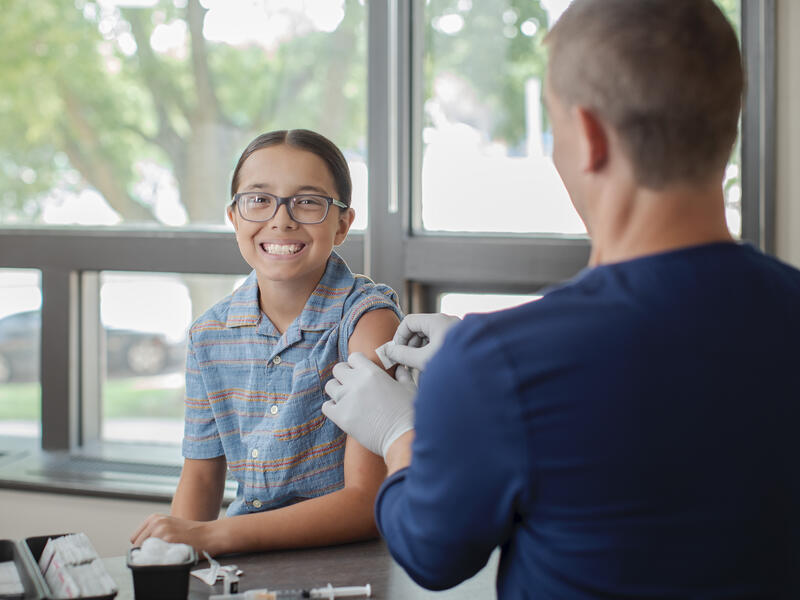It almost sounds too good to be true: a vaccine that can help prevent cancer long before it might start.
Only two vaccines can do this. One is the hepatitis B vaccine, often given to infants to help prevent liver cancer. The other is the HPV vaccine.
The HPV, or human papillomavirus, vaccine offers protection from the nine HPV strains that most commonly cause cancer. The vaccine helps prevent six types of cancer:
- Anal
- Cervical
- Oropharynx (mouth and throat)
- Penile
- Vaginal
- Vulvar
Ideally, kids start the HPV vaccine series as early as age 9, but all kids should have a complete series by age 13 before they are exposed to the virus. HPV vaccination can be included as part of annual well child visits.
Sanford Health has been nationally recognized by the American Cancer Society and the National HPV Vaccination Roundtable or its efforts in getting kids ages 9 and up the human papillomavirus vaccine. The Age Nine Champion Award denotes Sanford’s commitment to increasing vaccination rates across its service area.
“By implementing a program to start vaccinations at age 9 throughout our system, we are offering our patients the best protection against HPV caused cancers as they age. The HPV vaccine works best when we give it to younger children before they are exposed to HPV,” said Andrea Polkinghorn, lead immunization strategist at Sanford Health.
“Almost everyone will get an HPV infection in their lifetime, so the childhood vaccine is an important step toward staying protected and preventing future cancers. Sanford is proud to start the conversation about prevention tools, helping families make an informed choice to vaccinate.”
The American Cancer Society and National HPV Vaccination Roundtable champions the efforts of health systems across the nation to raise HPV vaccination rates and prevent future cancers.
Polkinghorn and Dr. Christina daSilva, a Sanford Health pediatrician, have answers to your questions about HPV.
What exactly is HPV?
There are many different types of HPV. While most do not cause any health problems, some types can cause genital warts and cancers. Vaccines can stop these health problems from happening.
Genital HPV is the most common sexually transmitted disease in the United States. It can also spread through skin-to-skin contact. Genital HPV often has no symptoms, but it can cause serious health problems, even without symptoms.
One potential symptom is genital warts. Genital warts usually appear as a small bump or group of bumps in the genital area. They can be small or large, raised or flat, or shaped like a cauliflower. The warts may go away, stay the same, or grow in size or number.
How do you know if you have an HPV infection?
You might not. Many people don’t experience symptoms or health problems. Visible symptoms can include genital warts, Dr. daSilva said. Cervical precancerous cells may be found during a routine Pap test.
Who should get the HPV vaccine?
Every adolescent — regardless of sex — should get immunized as early as 9 years old, ideally between 9 and 12. This ensures they get full protection against the virus later, Polkinghorn said. They need two doses, with the second being given six to 12 months after the first.
“The HPV vaccine is the safest and most effective way to prevent the cancers caused by HPV infection. The vaccine works best and is most effective when administered between the ages of 9 and12. However, if someone ages 13 through 26 hasn’t been vaccinated, the vaccine still offers benefits. In some cases, the vaccine may be beneficial for adults who are 27 to 45 years old,” Polkinghorn said.
Anyone may get the vaccine, unless the person is pregnant, had an allergic reaction to a past dose or is ill at the time. After age 26, it’s more likely patients have already been exposed to HPV. If they’re still unvaccinated, they should discuss whether to receive the HPV vaccine with their doctor.
When should patients get the HPV vaccine?
Sanford Health promotes HPV vaccination as part of annual well child exams. The exams and vaccines are typically covered by insurance plans.
Regular well child visits help ensure children are staying healthy. They monitor a child’s growth and development and give parents the chance to ask about nutrition, behavior and other concerns about their child’s health.
In some places, school requirements for the Tdap and meningitis vaccines fall at the same time as the recommended HPV timing.
“Our job as health care professionals is to ensure that we’re offering our patients the best protection that we know from a medical standpoint. And the HPV vaccine is definitely a piece of that puzzle,” Polkinghorn said.
How effective is the HPV vaccine?
Studies have shown that the HPV vaccine has proven very effective at preventing the types of cancer caused by the virus strains it includes.
Infections of the HPV strains that cause cancers and genital warts have dropped 88% among teen girls and 81% among young adult women since 2006. Among vaccinated women, the percentage of HPV-linked cervical precancers has dropped by 40%.
How safe is the HPV vaccine?
The HPV vaccine is very safe. There are more than 15 years of HPV vaccine safety data to back this up. More than 135 million doses have been given since the vaccine was licensed, according to the CDC.
“Vaccines, in general, have the most rigorous safety monitoring,” Polkinghorn said.
Potential side effects typical of the HPV vaccine and other routine vaccinations are usually mild and only last a day or two. The most common are redness or tenderness at the injection site.
Learn more
- Vaccines for Children program offers free immunizations
- Immunization myths and when kids need each shot
- ‘Her Kind of Healthy’ podcast: Importance of getting the HPV vaccine
…
Posted In Back to School, Cancer, Children's, Gynecology, Health Information, Healthy Living, Immunizations, Women's
